As the year begins, news of the junta or State Administration Council (SAC) defeat at a lighting speed which seems unstoppable, in its fight against the assorted revolutionary forces countrywide against its rule hit the headlines.
To start with Laukkai, capital of the Kokang Self-Administered Zone, fall into the hands of Myanmar National Democratic Alliance Army (MNDAA) or which is popularly known as Kokang on January 4, coinciding with the occasion of 75th anniversary Independence Day of Burma or Myanmar from the British.
On January 5, The Kokang News and Media writes: “It can be said that there is not a single soldier of the military council is left in the entire Kokang region. On January 4th yesterday the entire force of Laukkai Regional Operations Command surrendered to the MNDAA. Six brigadier generals, more than 2,100 soldiers and more than 1,600 family members were involved in the surrender.”
Starting at 3:00 a.m. on January 5th, the Three Brotherhood Alliance (3BHA) together with its allies, entered Hopan city en masse, and took over the police station, general administration office, and hospital. During the day hundreds of United Wa State Army (UWSA) forces entered Hopan town, hoisting flags in their military vehicles. In addition, UWSA flags were raised in all the departmental offices in Hopan, and the UWSA troops stationed within the entire Hopan city. It is understood that the entry of UWSA has been pre-arranged with the 3BHA. The UWSA entered Hopan while the 3BHA was attacking the Light Infantry Battalion (LIB) 145. At about 9:00 a.m. UWSA and 3BHA negotiated an agreement with the LIB 145 and LIB 143 to surrender, which they did. The arsenal from both junta battalions were said to be handed over to the UWSA, according to Narinjara and Khit Thit Media reports of January 5.
All the junta troops which have surrendered were already been sent to Kengtung and Lashio through UWSA controlled areas. According to The Irrawaddy the six brigadier generals were first flown to Lashio from Tangyang and later to Naypyitaw, where they were detained in military prisons. While they are still under military prison at the moment they are expected to be released soon, as the surrender in Laukkai has been made with the approval of junta boss Gen. Min Aung Hlaing, according to the report.
But the latest report in Khit Thit Media reported that Min Aung Hlaing was mad at the six brigadier generals that surrendered to MNDAA at Laukkai and will persecute them for negligence of duty and mutiny. Min Aung Hlaing is especially outrage of the photos posted on social media widely where the generals were seen drinking and toasting drinks with the MNDAA officers.
SAC spokesman gave reason for the surrender
Responding to the Popular News Journal which is the mouthpiece of the junta, its spokesman Gen Zaw Min Tun said: “Tatmadaw (Myanmar army) has thought about it (surrender of Laukkai) from different angles. In Laukkai apart from the Tatmadaw soldiers their family members are also living with them. Their security has been given a priority.”
Besides he said the junta troops are being one-lopsidedly fired upon from the 3BHA. He added: “In this respect the armed groups portrayed as if Myanmar Tatmadaw has fired (into China) to disrupt the two countries friendship, when in fact it was them who are firing. By taking such facts into consideration, the regional commanders have done their best, I would say.”
Two stray artillery shell hit the Chinese side of the border town and at least 5 civilians were said to be wounded, in which China has strongly complained and warned the warring parties not to let it happen again, according to Federal Journal of January 7.
Gen. Zaw Min Tun also said: “It is evident that even after 76 years of independence Myanmar’s lack of progress is due to internal armed conflict. That’s why we are trying to end this as soon as possible using all means possible,” according to the Western News report of January 7.
The third round of peace talks
The third round of peace talks mediated by China will be held in Kunming , China from 7 to 9 according to the various news reports.
It is expected to touch upon the territorial demarcation, opening of trade routes, junta acceptance of Kokang Self-Administered Zone run by the MNDAA, Ta’ang National Liberation Army (TNLA) bargaining for more control territories that it has seized to be included into its aspired Ta’ang State status issues, among others.
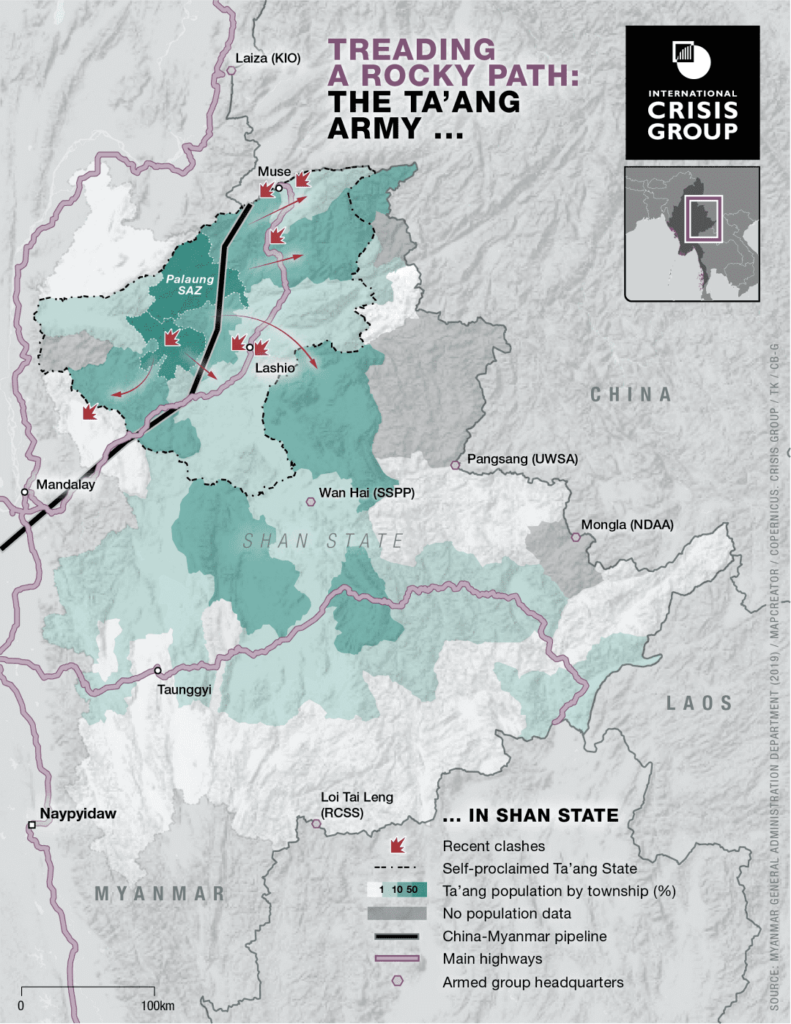
China may at least push for a truce of the warring parties, if not total agreement on all issues. Reportedly, China is for the democratization process under 2008 military-drafted constitution according to its previous statements made.
In sum, it will all depend on if the 3BHA will uphold its promise to change the dictatorship system according to the people’s desire or be satisfied with piecemeal solution of area demarcation adjustment and economic incentive with the junta.
China’s Naypitaw visit
Deputy foreign minister Sun Weidong, ambassador Chen Hai and regional special envoy Deng Xijun met Min Aung Hlaing in Naypyitaw on January 5, according to the military junta.
The visit lasted from 5 to 7, according to the BBC Burmese report of January 5.
Deng has brokered peace talks between the junta and 3BHA, which is on offensive along Myanmar-China border and also in Arakan State, where China has invested various mega projects and now gearing to develop deep sea port in Kyaukphyu.
According to the junta news outlet China-Myanmar border tranquility and peace are the main topic of discussion.
”Their main discussion is to stop the war in the north as soon as possible. Another thing is that they want to know the opinion of the military council on how to solve the problem of conflict in the north, even though China is telling them to stop it. So they discussed that,” said a source familiar with the Chinese special representative’s itinerary.
Sources close to the Chinese government say that they are also discussing the continued crackdown on online fraud gangs and the arrest of ten millionaires who have been issued warrants by China. However, in the press release of the military council, there is no mention of discussing the suppression of online money laundering gangs. Reportedly, the wanted ten people are under the junta’s custody, which are said to be under the same blanket with the junta in all their illegal activities.
The Chinese team met with the Chairman of the Military Council as well as the Deputy Minister of Foreign Affairs of the Military Council and discussed the continuation of implementation concerning the Myanmar-China projects. It is also reported that they discussed to continue speeding up the work under the Myanmar-China Economic Corridor and the Silk Road Project.
Other than that a source close to the military council said, citing some information he knows, that the Chinese delegation has requested a meeting with Aung San Suu Kyi, who has been ousted by the military.
“China has repeatedly requested to meet Daw Aung San Suu Kyi. It has asked for it once again, but heard that Min Aung Hlaing has not yet given permission. On the other hand, depending on whether or not they are allowed to meet with Daw Aung San Suu Kyi, China may change its stance about Myanmar,” the source told the BBC.
Shan armies sitting out
Against this political backdrop, many are surprise why the two Shan armies are mum with deafening silence on what is happening within the political landscape of Shan State.
An opinion piece written in Shan News in Burmese also deplore such inactivity and indifference and at a loss as to why the two armies act that way, including the Shan Nationalities League for Democracy (SNLD), which was the most powerful political party after National League for Democracy (NLD).
According to Editor in Chief of Shan News, Sai Merng who aired his opinion in a discussion forum about two weeks ago he questioned the two Shan armies the Shan State Progress Army (SSPP), Restoration Council of Shan State (RCSS) and the political party SNLD on the situation in northern Shan State, where they failed to utter a word in protection of the Shan population who have to bear the brunt of the Operation 1027.
He said the SSPP, which is part of the Federal Political Negotiation and Consultative Committee (FPNCC) where the 3BHA are also members, failed to ask that it protect and treat them kindly by not camping in towns and villages so they would be spared from junta’s artillery bombardment and repeated airstrikes, not to mention the heavy taxes they have levied on the population, including forceful recruitment of their sons and daughters into the alliance and other human rights violations.
Likewise, he asked why the RCSS has also been silent when it accepted itself to be part of Nationwide Ceasefire Agreement (NCA)-based peace process backing the junta. Its leader Gen. Yawd Serk even received an honorary Wunna Kyawhtin title from the junta on April 17, 2022 Myanmar New Year’s Day. He should at least ask the junta to spare the people from bombardment of their towns and villages, he pointed out.
In the same vein, the SNLD which was second to the NLD in popularity and received massive Shan public support in 2020 nationwide election, didn’t even issue a single statement on behalf of the Shan people in the ongoing war where they have to suffer with no one to turn to.
On top of that the people don’t understand why they refused to come to the protection of the Shan people and their territories and let other ethnic armies took over their towns and villages. After all the two Shan armies have vowed to do exactly just that but hopelessly failed to deliver.
However, a glimmer of hope is still there for the Shan people as the two Shan armies have signed an official ceasefire a month ago after years of fighting each other. This was followed by the release of prisoners of war from both sides.
Where to Shan political actors?
In such a situation the Shan political actors, armed and unarmed, will now have to think earnestly on how to act in the midst of Spring Revolution and Operation 1027 which they are caught up in. It won’t do to be inactive, indifferent and uninterested.
Like the recent Shan News opinion piece rightly pointed out if they sit out the revolutionary tide for whatever reason they will have to take the back seat in the future political configuration of Shan State.
In this sense, the Shan armies need to speed up their unity and reconciliation process and secure their parameters and take effective control of their areas, including the protection of the Shan population.
The Shans should know that time and tide wait for no man. They should also be aware of who are the enemies and friends. In the mean time they should make use of the Committee for Shan State Unity (CSSU) Manifesto which outlines the “unity in diversity” of all ethnic groups within Shan State and aims at a Federated Shan States as their guidelines.
True, some ethnic groups may aim for a higher form of administrative status, for example a fully fledged constituent states on which the Ta’ang, Pa-O and Wa are aspiring. These could all be talked over once the military junta is out of the political scene, as political mapping procedure countrywide will have to follow by all means. In other words, all stakeholders will have to sit down at the table and agree upon the criteria and principles in the creation of new constituent states, which will be integrated in the future federal democratic constitution. Suffice it to say that might is right will have no place in new constituents creation but democratic dialogue and commonly agreed political mapping procedure among stakeholders, not only for the Shan State but other states and divisions of the whole country as well.





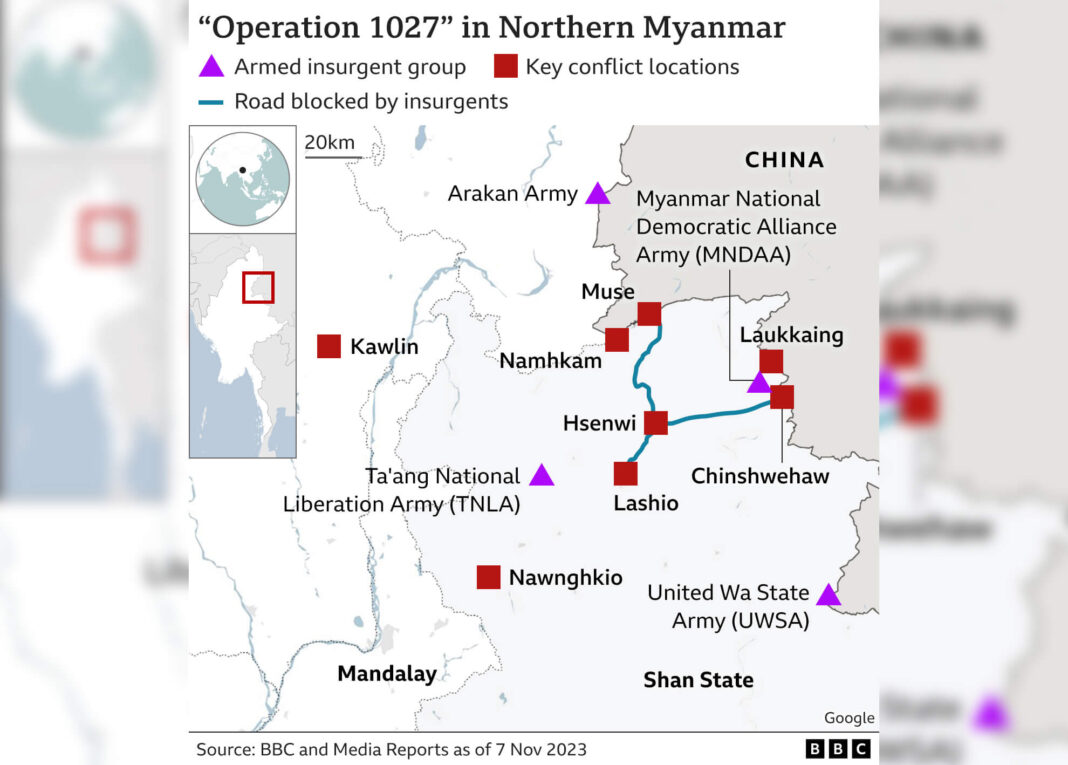
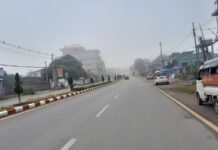

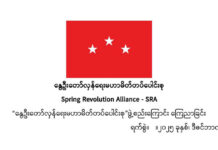
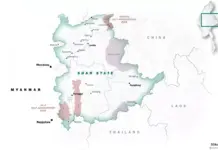
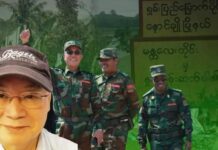






Leave a Comments